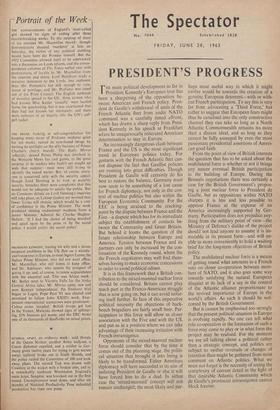PRESIDENT'S PROGRESS
THE main political development so far in President Kennedy's European tour has been a sharpening of the opposition be- tween American and French policy. Presi- dent de Gaulle's withdrawal of units of the French Atlantic fleet from under NATO command was a carefully timed affront, which has drawn a sharp reply from Presi- dent Kennedy in his speech at Frankfurt where he unequivocally reiterated American determination to stay in Europe.
An increasingly dangerous clash between France and the US is the most significant trend in European politics today. For gestures with the French Atlantic fleet can- not disguise the fact that Gaullist policies are running into great difficulties. Though President de Gaulle will certainly do his best to restore the balance, Germany must now seem to be something of a lost cause for French diplomacy, not only in the con- text of nuclear politics but also within the European Economic Community. For the EEC is being strained to the cracking- point by the dispute between France and the Five—a dispute which has for its immediate subject the establishment of contacts be- tween the Community and. Great Britain. But behind it looms the question of the future relationship between Europe and America. Tension between France and its partners can only be increased by the con- tinuation of the Kennedy round, where the the French negotiators may well find them- selves having to make economic concessions in order to avoid political odium.
It is in this framework that a British con- tribution to the mixed-manned nuclear force should be considered. Britain cannot play much part in the Franco-American struggle that is now going on, but it can avoid isolat- ing itself further. In face of this imperative political necessity the objections of back- bench brigadiers are fairly small beer. Par- ticipation in this force will allow us closer association with the Five and with the US, and put us in a position where we can take advantage of their increasing irritation with French intransigence.
Opponents of the mixed-manned nuclear force should consider that by the time it comes out of the planning stage, the politi- cal situation that brought it into being is likely to be transformed. Either American diplomacy will have succeeded in its aim of isolating President de Gaulle or else it will have forced him to do a deal. In either case the 'mixed-manned' concept will not remain unchanged; the most likely and per- haps most useful way in which it might evolve would be towards the creation of a genuine European deterrent—with or with- out French participation. To say this is very far from advocating a 'Third Force,' but rather to suggest that European fears might thus be canalised into the only constructive channel they can take so long as a North Atlantic Commonwealth remains no, more than a distant ideal, and so long as they cannot be fully assuaged by even the most passionate presidential assertions of Ameri- can good faith.
From the point of view of British interests the question that has to be asked about the multilateral force is whether or not it brings any nearer eventual British participation in the building of Europe. During the Brussels negotiations there was certainly a case for the British Government's propos- ing a joint nuclear force to President de Gaulle, but as oppositions within NATO sharpen it is less and less possible to appease France at the expense of an America increasingly supported by Ger- many. Participation does not prejudice any- thing from the military point of view—the Ministry of Defence's dislike of the project should not lead anyone to assume it is im- mutable in its present form—and will en- able us more conveniently to hold a waiting brief for the long-term objectives of British policy.
The multilateral nuclear forte is a means of getting round what amounts to a French veto on closer co-operation between mem- bers of NATO, and it also goes some way towards satisfying the natural European disquiet at its lack of a say in the control of the Atlantic alliance proportionate to the revived importance of Europe in the world's affairs. As such it should be wel- comed by the British Government.
But it cannot be emphasised too strongly that the present political situation in Europe is evolving rapidly. No one can tell what role co-operation in the formation of such a force may come to play or in what form the project may be realised. For the moment we are all talking about a political rather than a strategic concept, and politics are subject to swifter reversals or changes of intention than might be gathered from most comment on Atlantic politics. What we must not forget is the necessity of seeing the complexity of current detail in the light of that desirable Atlantic Community which fie Gaulle's provincial intransigence cannot block forever.






























 Previous page
Previous page